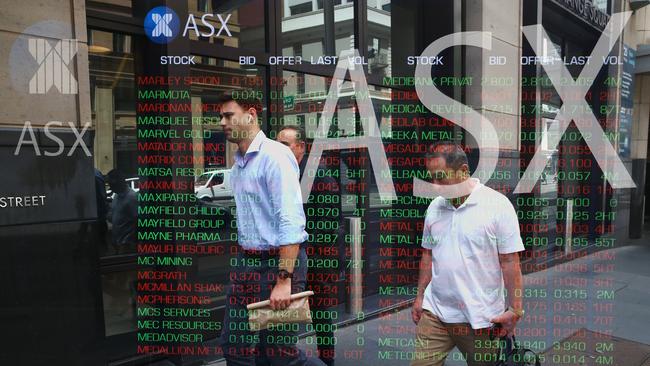Corporate earnings vulnerable and shares will struggle again, says Tyndall’s Brad Potter
The head of equities at Tyndall Asset Management sees consensus estimates for corporate earnings coming down.

Brad Potter thinks Australian shares will struggle to make meaningful gains this year.
The end of Covid-19 restrictions in China will partly offset a sharp slowdown in the global economy after a reopening boom last year, and the resources sector in particular is set to benefit from China’s reopening as well as longer-term themes like decarbonisation and deglobalisation.
But the head of equities at Tyndall Asset Management sees consensus estimates for corporate earnings estimates coming down as the global economy slows after aggressive interest rate rises.
Another year of weak returns from the overall market would come as a further blow to passive investors, after the ASX 200 Accumulation index fell 1.1 per cent in 2022 while rates soared.
Mr Potter argues that growth stocks are overpriced and investors should seek out value.
“The market will struggle to get meaningful gains this year, given where the earnings are going to go, but within that there are some very good opportunities because there are stocks that look extraordinarily cheap and stocks that look extraordinarily expensive,” he said.
“You want to be in the value end of the market … we’ve moving into a stock picker’s paradise in the next few years, where you need to do a bit more work to find the value.”
The Australian market has burst out of its starting blocks with a 5.7 per cent year-to-date rise. After falling as much as 14 per cent in 2022, the index finished the year down 5.5 per cent.
On Thursday it jumped 0.6 per cent to a nine-month high of 7437.6 points as slightly weaker than expected December labour force data cooled expectations of further interest rate increases.
Market pricing implied a less than 50 per cent chance of another 25 basis point rate rise from the Reserve Bank next month, and the market-implied “terminal rate” of cash fell to 3.53 per cent.
The Reserve Bank’s current cash rate target is 3.1 per cent.
Last year was particularly volatile for global markets and both passive and active funds struggled to generate positive returns, but Potter said the weak scorecard for active fund managers was worsened by the fact that many were exposed to growth stocks which underperformed.
“The problem with that analysis is that the vast majority of stock pickers are ‘growth’,” he said. “Value stock pickers have done well … we outperformed by about 6.5 per cent last year.”
Tyndall's Australian equities portfolio returned 5.34 per cent before fees in 2022 versus minus 1.08 per cent for the S&P/ASX 200 Accumulation index.
The fund has returned 10.43 per cent since inception versus 9.22 per cent for its benchmark.
As inflation pressures cool after excessive price growth since the pandemic, the market is expecting disinflation to drive US interest rate cuts in the second half, underpinning share market valuations. But it could be a year of slow economic growth and still relatively-high inflation.
“It looks like we could be heading into stagflation-like territory globally, where inflation and interest rates are high and economic growth is low,” Mr Potter said.
His bottom line is that the world could be heading for much lower growth, and earnings will come off in many areas amid a “double whammy” of both lower revenues and higher costs.
“My view is that these long-duration growth companies that have been trading at extraordinary premiums in terms of revenue multiples, they’re still extraordinarily expensive,” he said.
“I don’t think they’re properly pricing in the new normal of higher interest rates.”
To be sure, Inflation will cool further as supply chain issues and the Ukraine war impacts alleviate.
But the “scourge” of inflation – as RBA governor Philip Lowe calls it – could remain high compared to the past 10 years, given obvious structural changes including labour shortages, persistent supply chain disruption and constrained supply of goods.
Australia benefited from strong immigration pre-pandemic, but overall, the combination of increasing consumer demand and decreasing supply of workers means global demand for labour is too high. “We hope central bankers have learnt their lesson, given they kept monetary policy too low for too long and entered Covid with very low interest rates,” Mr Potter said.
“It is difficult to envisage rates being that low outside an emergency, meaning higher interest rates are here to stay.”
He predicted rising costs of energy, interest rates and labour would be substantial headwinds for many companies and, as margins continued to come under pressure, expected downgrades in 2023.
“Labour pressures are being felt in both wages and from the global impact of apparent labour shortages,” Mr Potter said. “It’s hard to see a short-term fix outside a substantial downturn.”
And with the impact of monetary policy typically lagging by 12–18 months, the Australian economy was yet to feel the full impact of tightening monetary policy, in which the cash rate went from 0.1 per cent to 3.1 per cent from May to December – the fastest pace of rate increases since the start of the inflation-targeting era in the early 1990s.
Full employment and an above-average savings have softened the impact, but the wealth impact of housing weakening further in 2023 will eventually put the brakes on consumption.
“The combined impact of the materially higher cost inputs of energy, interest rates and labour should become clear over the March quarter,” Mr Potter said.
“Margins are currently at high levels, and we expect pressure, particularly in companies and industries that have little pricing power to fight the inflationary forces.”




To join the conversation, please log in. Don't have an account? Register
Join the conversation, you are commenting as Logout